Related Research Articles
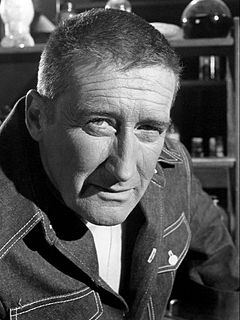
Frank Morrison Spillane, better known as Mickey Spillane, was an American crime novelist, whose stories often feature his signature detective character, Mike Hammer. More than 225 million copies of his books have sold internationally. Spillane was also an occasional actor, once even playing Hammer himself.
Philip Marlowe is a fictional character created by Raymond Chandler, and exemplifying the hardboiled crime fiction genre. Marlowe first appeared under that name in The Big Sleep, published in 1939. Chandler's early short stories, published in pulp magazines such as Black Mask and Dime Detective, featured similar characters with names like "Carmady" and "John Dalmas" starting in 1933.

Crime is a typically 19th-, 20th- and 21st-century genre, dominated by British and American writers. This article explores its historical development as a genre.

Farewell, My Lovely is a novel by Raymond Chandler, published in 1940, the second novel he wrote featuring the Los Angeles private eye Philip Marlowe. It was adapted for the screen three times and was also adapted for the stage and radio.
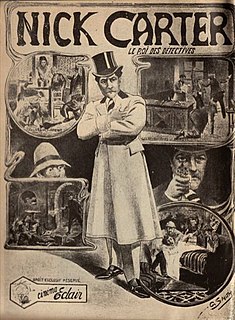
A mystery film is a genre of film that revolves around the solution of a problem or a crime. It focuses on the efforts of the detective, private investigator or amateur sleuth to solve the mysterious circumstances of an issue by means of clues, investigation, and clever deduction.

The Continental Op is a fictional character created by Dashiell Hammett. He is a private investigator employed as an operative of the Continental Detective Agency's San Francisco office. The stories are all told in the first person and his name is never given.
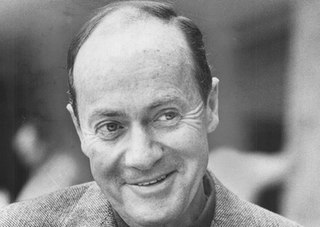
Ross Macdonald was the main pseudonym used by the American-Canadian writer of crime fiction Kenneth Millar. He is best known for his series of hardboiled novels set in Southern California and featuring private detective Lew Archer. Since the 1970s, Macdonald's works have received attention in academic circles for their psychological depth, sense of place, use of language, sophisticated imagery and integration of philosophy into genre fiction.

Hardboiled fiction is a literary genre that shares some of its characters and settings with crime fiction. The genre's typical protagonist is a detective who battles the violence of organized crime that flourished during Prohibition (1920–1933) and its aftermath, while dealing with a legal system that has become as corrupt as the organized crime itself. Rendered cynical by this cycle of violence, the detectives of hardboiled fiction are often antiheroes. Notable hardboiled detectives include Dick Tracy, Philip Marlowe, Mike Hammer, Sam Spade, Lew Archer, Slam Bradley, and The Continental Op.
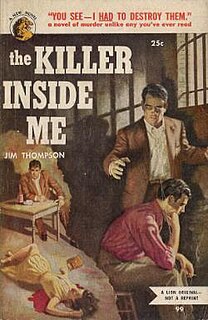
Noir fiction is a subgenre of crime fiction.

Chester Bomar Himes was an American writer. His works, some of which have been filmed, include If He Hollers Let Him Go, published in 1945, and the Harlem Detective series of novels for which he is best known, set in the 1950s and early 1960s and featuring two black policemen called Grave Digger Jones and Coffin Ed Johnson. In 1958 Himes won France's Grand Prix de Littérature Policière.
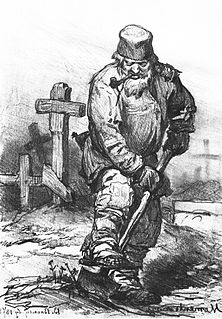
A gravedigger is a cemetery worker who is responsible for digging a grave prior to a funeral service.
A gravedigger is a cemetery worker who is responsible for digging a grave prior to a funeral service.

Plan B is an unfinished novel published posthumously in America in 1993 by Chester Himes, which is the final volume in the Harlem Cycle. The story is even darker and more nihilistic than the preceding volumes, culminating in a violent revolutionary movement in the streets of America.
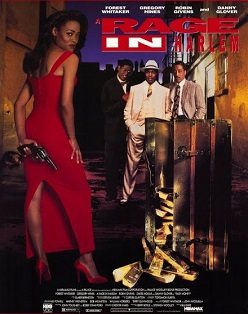
A Rage in Harlem is a 1991 American crime film directed by Bill Duke and loosely based on Chester Himes' novel A Rage in Harlem. The film stars Forest Whitaker, Danny Glover, Badja Djola, Robin Givens and Gregory Hines. Producer Stephen Woolley intended it to be a comedy film, and several reviewers have described it as such, but this categorization has been disputed by director Bill Duke.

Cotton Comes to Harlem is a 1970 American neo-noir action comedy thriller film co-written and directed by Ossie Davis and starring Godfrey Cambridge, Raymond St. Jacques, and Redd Foxx. The film is based on Chester Himes' novel of the same name. The opening theme, "Ain't Now But It's Gonna Be," was written by Ossie Davis and performed by Melba Moore. The film was one of the many black films that appeared in the 1970s and became an overnight hit. It was followed two years later by the sequel Come Back, Charleston Blue.

Come Back, Charleston Blue is a 1972 American comedy film starring Godfrey Cambridge and Raymond St. Jacques, loosely based on Chester Himes' novel The Heat's On. It is a sequel to the 1970 film Cotton Comes to Harlem.
James Sallis is an American crime writer who wrote a series of novels featuring the detective character Lew Griffin set in New Orleans, and the 2005 novel Drive, which was adapted into a 2011 film of the same name.

The Real Cool Killers is a hardboiled crime fiction novel written by Chester Himes. Published in 1959, it is the second book in the Grave Digger Jones & Coffin Ed Johnson Mysteries. The protagonists of the novel, Grave Digger Jones and Coffin Ed, are a pair of black detectives who patrol the dangerous slums of Harlem. The book was originally published in French under the title Il pleut des coups durs.

Cotton Comes to Harlem is a hardboiled crime fiction novel written by Chester Himes in 1965. It is the sixth and best known of the Harlem Detective series. It was later adapted into a film of the same name in 1970 starring Godfrey Cambridge, Raymond St. Jacques, and Redd Foxx.
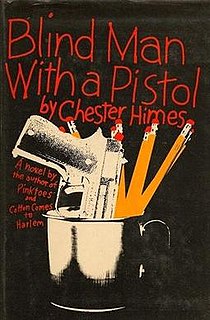
Blind Man With a Pistol is a 1969 fiction novel by Chester Himes. It is the 8th book in the Harlem Cycle series.
References
- ↑ Margolies, Edward (1997). The Several Lives of Chester Himes. Jackson: University Press of Mississippi. pp. 98–100. ISBN 0878059083 . Retrieved 4 May 2022.
- ↑ "Home". goodreads.com. Goodreads. Retrieved 4 May 2022.
- ↑ "The Coffin and Grave Digger Mysteries", Chester Himes books.